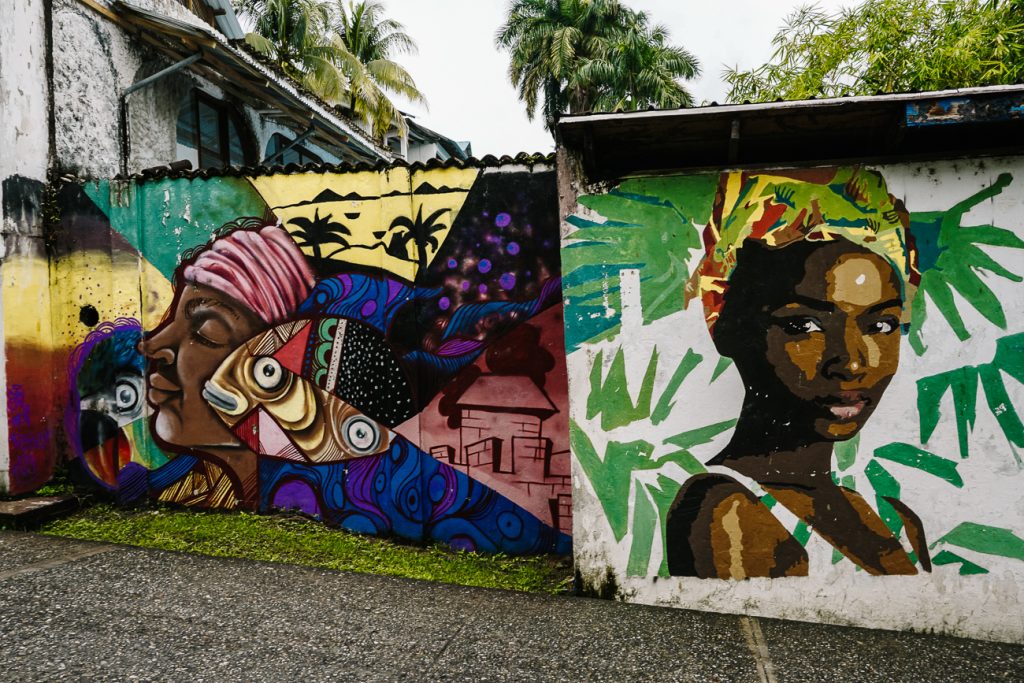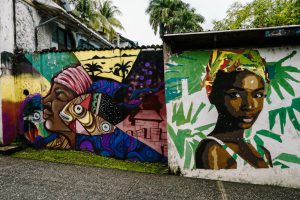

presentation../ Passport the World
In acknowledgment of Indigenous Peoples’ Day, the Brooklyn College Puerto Rican Alliance (PRA) hosted an online discussion about Indigeneity’s complexity and its erasure in Central American history. With her focus on the Afro-Indigenous Garifuna people, guest-lecturer and Garifuna scholar Daisy E. Guzmán Nuñez challenged the concepts of neo-colonialism and anti-Blackness embedded in the nationhood of the Americas.
“Their Blackness overshadows their Indigeneity in the eyes of those who look for certain qualities to be able to label an Indigenous person. So in terms of geography and social politics, Blackness and labor are intertwined with violence towards Garifuna people and other Black Indigenous people in Central America, solely based on phenotype,” said Guzmán Nuñez. Her project at the University of Texas, “From La Buga to the South Bronx: Garifuna Women Embodied Cartographies,” traces the Garifuna people’s diaspora in the United States. Despite their displacement from their original lands, Garifuna people have settled in predominantly Black urban spaces like Harlem and South Bronx, carrying on the spirit of Garifuna Wagia, or “We Are Garifuna.”
Before starting the event, Daniel Vázquez Sanabria, President of PRA, shared a land acknowledgment that called for participants to “dismantle the ongoing effects of settler colonialism.” He reminded them that cities and institutions like Brooklyn College lay on the stolen lands of Lenni Lenape and other Indigenous peoples.
“This is where together, we must continue and persist. Land acknowledgments do not exist in the past tense. Colonialism is a current, ongoing process, and we need to build the mindfulness of our present participation in it,” said Sanabria.
Neo-colonialism stems from the invasion of European settlers, which has led nations like Honduras or Belize in Central America to be founded on the grounds of anti-Blackness and white supremacy, Guzmán Nuñez argued. Consequently, the history of these nations has highlighted the descendants of European settlers, pushing to erase the Black experience – by extension, that of Afro-Indigenous people. In Latin America, Indigeneity and Blackness are often seen as two separate identities – not as one.
“As an identity, Afro-Indigenous is a subjectivity that sustains a form of Blackness that exists outside of the ethnogenesis of the Middle Passage,” Guzmán Nuñez said. The common misconception about Blackness in Central America is that it only exists due to slave trades like the Middle Passage, which subsequently ignores Afro-Indigenous people’s existence. “As Garifuna people claim an ethnohistory that removes them from the experience of the plantation, their contemporary struggles exist in the wake of the plantation.”
With the waging of civil wars in El Salvador, Honduras, Guatemala, and other countries, Garifuna people faced sociopolitical displacement that led them to migrate to the United States. In each city they settle in, the Garifuna carry on a cycle of “belonging and disbelonging” that does not necessarily tie them to the land itself, but their identity as Afro-Indigenous. By migrating, the Garifuna embody their Black resistance and mobility as they maneuver through new cities like New York, Guzmán Nuñez shared. To preserve and embrace their Afro-Indigeneity, Garifuna women have recreated their communal space that “form an extension of home” for their people.
“The resistance as seen through performances, political collective, and matrilineal networks are all part of what makes them Garifuna,” said Guzmán Nuñez.
As a Garifuna New Yorker herself, Guzmán Nuñez began studying her identity politics as an undergraduate, after having limited access to the experiences of Black and Afro-Indigenous people in Latin America. Using Black feminist anthropology, Guzmán Nuñez has explored the Afro-Indigenous experience as a Black experience.
“My politics of citation respect the legacies of Black feminist thought and Black feminist anthropology that before was limited by the White patriarchial legacies of social and cultural anthropology, that does not engage Blackness as an Indigenous anthology, but rather as ‘slavish slock’ and products of oppression within the White gaze,” said Guzmán Nuñez.
Today, Garifuna people continue to protect their history and publicly display their resilience. This year, many Garifuna decided to launch a political movement where they check the “Black” race box and write in their identification as “Garifuna” on the census. In doing so, participants ensure that NYC will have an accurate count of Garifuna people since it is the “largest Garifuna community outside of Central America,” Guzmán Nuñez said.
Though the identity of Garifuna people has yet to be fully recognized by Latin America, their inclusion is possible, but systemic change is needed. Nations must first recognize the anti-Blackness and colonialism embedded in their political system, Guzmán Nuñez mentioned. However, since the nation was created with the intent of excluding Black people, becoming part of Latinidad can present a reconfiguration of identity politics for Garifuna people.
“For me, Garifuna never put into question my Blackness. Garifuna was always Black. So to redefine myself as ‘Afro-Latina’ and to re-explain my Blackness, is to add erasure to a history that did not have it. There’s a history of displacement and political unjust that is always in relation to Garifuna people,” Guzmán Nuñez said. “But to name yourself in 2020, is a personal politics that give Garifuna people room to engage with the complexities of their identity as Afro-Indigenous, as Garifuna, as Afro-Latino, or as Afro-Central American if they so do choose.”
